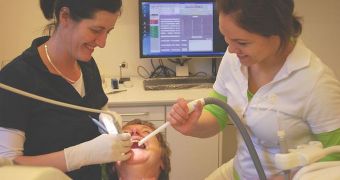A new scientific study has demonstrated the influence that the parents' actions have on their children, at least as far as going to see the dentist is concerned. The research shows that children of parents who consult their dental healthcare experts regularly are more likely to do the same, and not fear the doctor as much as other kids do. The investigation could set the norm for new efforts to make the general public (and parents especially) aware of the fact that setting an example may help their children later on in life.
“When parents don't see the dentist, their children are much less likely to see the dentist. We also found that the children of parents who have put off their own dental care for financial reasons are more likely to have their care deferred due to cost as well. It looks like strategies to promote oral health should focus on the whole family,” Massachusetts General Hospital for Children (MGHfC) Center for Child and Adolescent Health Policy expert Inyang Isong, MD, MPH, explains. He is also the leader of the new study, which appears in the latest online issue of the esteemed scientific journal Pediatrics, PhysOrg reports.
Tooth decay is one of the most common childhood conditions, the researchers add, and the fact is that kids coming from minority and low-income environments tend to have it worst off. Children's dental habits were also associated in previous studies with other factors, including the availability of dentists' offices in their area, their parents' financial situations and education levels, and the insurance cover. But the recent work is the first to look at the influence that parental example has on these habits. Data collected during the 2007 National Health Interview Survey and its Child Health Supplement were used for establishing the new conclusions.
“Even when children are covered by medical insurance, it appears that financial barriers are influencing parents' decisions about accessing dental care for their children. We're now in the process of looking at the impact of dental insurance – something not addressed by the NHIS – and other enabling resources on the relationship between parents' and children's receipt of dental care,” Isong, who is also an MGHfC clinical fellow, adds. The recent survey was conducted on more than 6,100 matched pairs (children and parents), and looked primarily at the reasons why people went or not to the dentist, and on how this was reflected in the kids' oral health.

 14 DAY TRIAL //
14 DAY TRIAL //